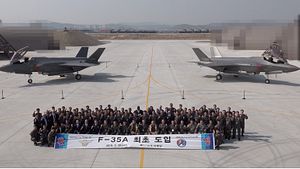North Korea slammed South Korea over its ongoing deployment of high-tech U.S. fighter jets, warning Thursday that it will respond by developing and testing unspecified special weapons of its own to “destroy” the aircraft.
The statement, which also urged South Korea to abandon its “preposterous illusions” for improved ties, comes as Seoul has expressed hopes that a recent summit between President Donald Trump and North Korean leader Kim Jong Un will help revive dialogue between the Koreas.
Under its biggest-ever weapons purchase, South Korea is to buy 40 F-35 fighter jets from Lockheed Martin by 2021. The first two arrived in March and two others are to be delivered in coming weeks, according to Seoul officials.
The project was announced in 2014 to cope with then rising military threats from North Korea, which was conducting an unusually large number of weapons tests. Animosities have gradually eased since last year when Pyongyang and Washington launched nuclear negotiations, but Seoul has been moving ahead with its already-approved F-35 procurement.
On Thursday, the North’s Foreign Ministry fired off fresh criticism, claiming the second batch of F-35s is coming in South Korea in mid-July, something that Seoul officials won’t confirm.
An unidentified policy research director at the ministry’s Institutes for American Studies said Seoul’s purchase of the U.S. jets was meant to “please the United States, their master, like eating mustard in tears,” though Seoul knows well the project is an “extremely dangerous action” that will increase military tensions.
The director said North Korea has “no other choice but to develop and test the special armaments to completely destroy the lethal weapons reinforced in South Korea.”The South Korean government didn’t immediately respond to the North’s statement. But arms procurement officials said the F-35 project would proceed as scheduled and that about 10 of the 40 jets were to be delivered by the end of this year.
Despite the warning, it’s unclear if North Korean can conduct a major weapons test any time soon because that would likely disrupt a positive atmosphere after the June 30 summit between Trump and Kim at the Korean border village of Panmunjom.
Though it lacked substance, the impromptu meeting was the first between Trump and Kim since their second summit in Vietnam in February collapsed without any agreement due to squabbling over U.S.-led sanctions on the North, and the two leaders agreed to resume working-level nuclear talks.
The latest statement didn’t criticize the U.S. directly. It was seen as more of a continuation of North Korea’s sensitivity to the introduction of sophisticated U.S. weapons on the Korean Peninsula, and dissatisfaction with Seoul since the Vietnam summit’s breakdown.
South Korean liberal President Moon Jae-in, who favors a negotiated resolution of the nuclear crisis, shuttled between Washington and Pyongyang last year to facilitate a flurry of diplomacy between the countries. He met Kim three times last year.
But since the Vietnam summit, North Korea has significantly reduced diplomatic activity and exchanges with South Korea and demanded that Seoul break away from Washington and resume inter-Korean economic projects held back by U.S.-led sanctions against the North. It recently urged Seoul to stop mediating between North Korea and the United States, though Kim joined a brief three-way encounter with Moon and Trump before he and the U.S. president went into a bilateral meeting at Panmunjom.
Since starting talks with Washington, Kim has suspended nuclear and long-range missile tests, allowing Trump to boast of a major achievement in his North Korea policy.
Kim Dong-yub, an analyst from Seoul’s Institute for Far Eastern Studies, said Thursday’s statement suggests that North Korea may perform an anti-air missile test, but not a ballistic one that is banned by U.N. Security Council resolutions.
Hyung-Jin Kim for the Associated Press.

































